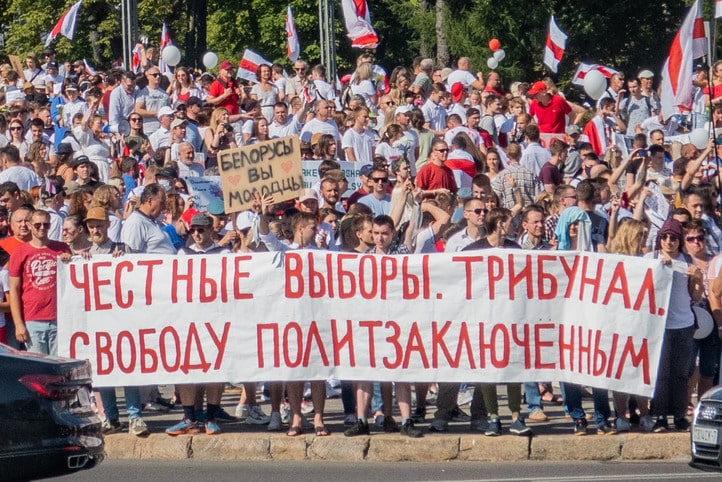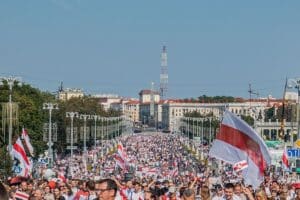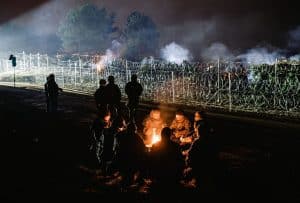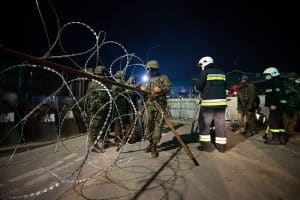Two weeks after a long time President Alexander Lukashenko claimed victory in the disputed elections, people are still protesting. The size and duration of the protests have been unprecedented for Belarus. Lukashenko has vowed to put an end to the unrest, for which he previously accused unnamed “dissidents supported from abroad”. Demonstrations have met with resistance from the state, many protesters were tortured after being detained, and at least four people have been killed so far.
Protest and its consequences
Media close to the opposition estimates that 100,000 people gathered this weekend at the central Independence Square in Minsk. Many carried red and white flags and flowers and shouted “freedom” and anti-regime slogans. Belarus opposition leader Svetlana Tikhanovskaya has vowed to “stand till the end” and added that if the protest movement stepped back now, they would be “slaves”.
Meanwhile, several thousand people in Lithuania – including President Gitanas Nauseda – have formed a human chain from the capital, Vilnius, to the Belarusian border, in solidarity with protesters in Minsk. Similar protests are planned in Tallinn, the capital of Estonia, and Prague, the capital of the Czech Republic.
Factory strikes are underway across the country, and dozens of media workers including reporters, news anchors and technicians, are quitting their jobs at state-owned news companies. Lukashenko said their positions have already been taken by Russian media workers who will set an example of good work. Vadim Shundalov, who worked at state-run Belarus Today, decided to leave after the killing of Alexander Taraikovsky. Namely, Taraikovsky died on the 10th of August as demonstrators took to the streets of the capital Minsk. The government said an explosive device that Taraikovsky intended to throw at police blew up in his hand., but a video appears showing him shot by police instead. Shundalov said he couldn’t report that at Belarus Today and regrets not leaving earlier.
Yegor Yemelyanov, a former captain of the Belarusian police from Novopolotsk, resigned from service. After quitting, he was detained for violation of the rules with regards to rallies. “Looking at what happened after the elections, I just couldn’t put on my uniform anymore. That’s my opinion: no normal person will stand up for such criminal orders,” said Yemelyanov. Following his resignation, 8 of his colleagues quit.
The Belarusian ambassador to Slovakia handed in his resignation after he recorded a video statement supporting ongoing protests.
What did Lukashenko say?
Lukashenko still insists that he won the elections fairly. State television broadcast footage showing Lukashenko arriving by helicopter at the presidential palace on Saturday, wearing a bulletproof vest and holding an automatic rifle.
Lukashenko accused NATO of “trying to overthrow the current government” and appoint a new president. He ordered the movement of military troops towards the western borders with Poland and Lithuania, where NATO troops are allegedly deployed. NATO says that they do not pose “any danger to Belarus or any other country”, as well as that “there is no deployment of troops in the region”.
Lukashenko also accused the Coordination Council of the opposition of trying to take over his presidential seat. Supporters of Svetlana Tikhanovskaya founded the Coordination Council for the peaceful surrender of power. Two members of the co-ordinating body were arrested. One of them is Sergej Dylevski who recently emerged as a protest leader. The other one is Olga Kovalkova, who is member of Svetlana’s team.
The Defense Ministry announced it would deploy the army to protect World War II memorials from protesters and ordered the closure of 4 metro stations in central Minsk. “This news has outraged people here. So far, only the riot police have been used against the protesters. It is unclear whether these soldiers will be willing to use force against unarmed demonstrators,” said DW’s correspondent Nick Connolly.
What did the EU say?
Following the video conference of the European Council on the 19th of August, Charles Michel president of the European Council concluded that the elections in Belarus were neither free nor fair. The EU doesn’t recognise the results and condemns the disproportionate violence displayed by the state authorities against peaceful protesters. It will impose sanctions against individuals responsible for violence, repression and the falsification of election results. Lastly, the EU fully supports OSCE proposals for dialogue in Belarus and is ready to provide assistance to further them.
German Vice-Chancellor Olaf Scholz said that Belarusian President Alexander Lukashenko should step down, as he had “lost all legitimation. Lithuania’s President Gitanas Nauseda said “The only way towards reconciliation is to solve the conflict peacefully. Nothing must be done towards the society that could lead to bitter sorrow.”
What did Russia say?
Russian Foreign Minister Sergei Lavrov said he hopes both sides in Belarus will join the talks and that there was no need for foreign mediation. However, he criticised Svetlana Tikhanovskaya, saying that her program is “neither constructive nor aimed at a dialogue.” He warned that opposition’s call for Lukashenko’s resignation is pushing Belarus toward a Venezuela-like scenario, adding that it is impossible to prove that Lukashenko did not win the presidential vote.
Lukashenko said Putin had promised to provide what he called “comprehensive assistance” in the event of external military threats to Belarus. Kremlin spokesman Dimitri Peskov said that there is currently no need for Russia to help Belarus militarily or in any other way. Russia still holds the position that the elections are an internal matter of Belarus.
Sources: DW 1, DW 2, BBC 1, BBC 2, BBC 3, Euronews 1, Euronews 2, Euronews 3,
Photo: Wikimedia Commons



